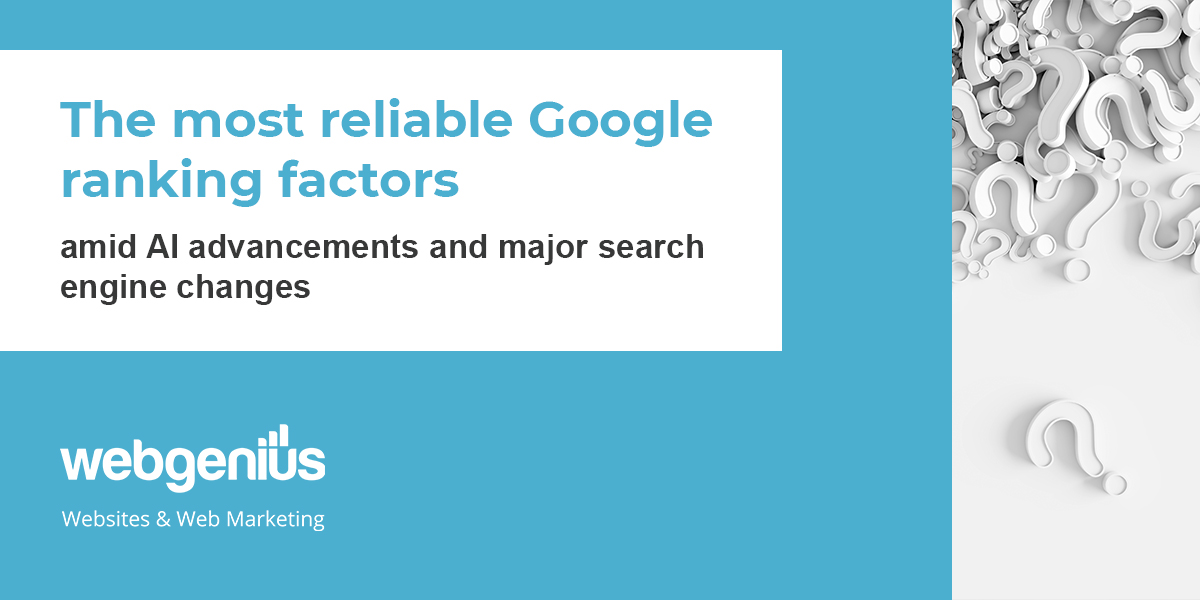The landscape of SEO has always been in flux, but recent years have brought massive change, especially with the rise of Artificial Intelligence (AI) related challenges and major Google algorithm updates. However, despite the increasingly complex and dynamic landscape, the fundamental focus for digital marketers in terms of remains remarkably consistent; providing high-quality, trustworthy content. Understanding and prioritising this will continue to be essential for maintaining and improving search visibility in these uncertain times.
Here, we delve a into the three of the top Google ranking factors according to the Search Engine Journal:
1. High-Quality Content
Understanding User Queries and Providing Relevant Information
The foundation of SEO lies in understanding what users are searching for and delivering high-quality content that meets those needs. Google’s primary objective is to match user queries with the most relevant content available. This means that your website must offer comprehensive, well-written, and engaging content that directly addresses the user’s intent.
E-E-A-T: A Framework for Quality Content
Google’s emphasis on E-E-A-T (Experience, Expertise, Authoritativeness, and Trustworthiness) underscores the importance of creating content that not only answers user queries but does so with authority and trustworthiness. Content that demonstrates real-world experience and expertise will always stand a better chance of ranking higher.
Keywords and Semantic Search
While some theories suggest that keywords have become obsolete, they remain crucial. Keywords help Google understand the relevance of your content to a specific query. Additionally, Google’s advanced machine learning systems, like RankBrain and BERT, help it understand the context and nuances of search queries, making it essential to integrate relevant keywords naturally into your content.
2. Page Experience
User Experience as a Ranking Signal
Google’s page experience update, which rolled out in 2021, emphasised the importance of delivering a good user experience. Although page experience might not always be the deciding factor in rankings, it plays a crucial role when multiple pages offer similar content. Key components of page experience include:
- HTTPS: Ensuring your site is secure.
- Page Speed: Fast-loading pages improve user experience and reduce bounce rates.
- Mobile Friendliness: As mobile search continues to dominate, optimising for mobile devices is non-negotiable.
- Core Web Vitals: Metrics like loading speed, interactivity, and visual stability are critical.
By focusing on these aspects, you can ensure that your website provides a smooth and enjoyable experience, which in turn can positively impact your rankings.
3. Links
Quality Over Quantity
Links have always been a cornerstone of SEO. However, the emphasis has shifted from the sheer volume of links to the quality and relevance of those links. Google’s algorithm assesses the quality of inbound links to determine the credibility and authority of your website. High-quality backlinks from reputable sources can significantly boost your rankings.
Internal Linking
Effective internal linking helps Google crawl and index your site more efficiently. It also allows you to create topic clusters, which can enhance the overall SEO strategy by interlinking related content. This not only improves user navigation but also helps distribute page authority across your site.
Historical Context and Evolution
Since Google’s inception, links have been a critical ranking factor. Despite various updates and attempts to downplay their importance, they remain a significant part of the ranking equation. As Gary Illyes from Google says, links may not always be among the top three factors, but their influence on SEO is undeniable.
Adapting to the changing SEO landscape
The dynamic nature of Google’s algorithms, coupled with advancements in AI, means that SEO professionals must continually adapt their strategies. However focusing on high-quality content, optimising page experience, and leveraging the power of quality links, still remains of utmost importance when it comes to ranking in Google.
Understanding Google’s core motivation—to provide users with the best possible search experience—should guide your SEO strategy. This common-sense approach, aligned with Google’s objectives, will help you achieve sustainable and long-term success in search rankings.
For more detailed insights, you can explore resources like Google’s “How Search Works” page and their Search Quality Raters Guidelines.
Working with a Search Engine Optimisation specialist like Web Genius can take the headache away from staying abreast of SEO trends and let you focus on your core business. Get in touch to talk to us about our Search Engine Optimisation packages today.
References:
This blog was adapted from “The Top 3 Google Ranking Factors That Really Matter” by Shelley Walsh, originally published on the Search Engine Journal, 2023
https://www.searchenginejournal.com/ranking-factors/top-ranking-factors

